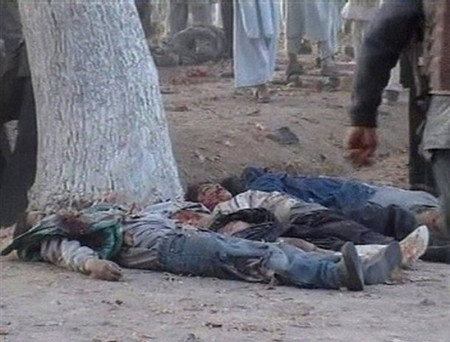By Hadi Kazimi
Ahmad Waleed has trouble remembering things.
“I forget everything. When I go to the shop, I pay the shopkeeper but forget to take my purchases home with me,” the 13-year-old student says.

In this image taken TV shows bodies of children after a suicide attack in Baghlan province, north of Kabul, Afghanistan on Tuesday, Nov. 6, 2007. A bomb attack targeted a group of lawmakers in northern Afghanistan on Tuesday, killing at least 74 people. The blast struck school children, Afghan elders and government officials who had gathered to greet the visiting delegation of 18 lawmakers from the lower house, officials said. (Photo: AP)
More Photos
Waleed blames his forgetfulness on a suicide attack which he survived three years ago. The boy was among dozens of students escorting a parliamentary delegation to a sugar factory in northern Baghlan province on Nov. 6, 2007, when a bomber blew himself up and killed 74 people.
Among the casualties were 62 students and eight members of Parliament’s economics committee. More than 100 civilians were injured.
Many of those who survived the attack still suffer, many from depression and mental illness. Some doctors and say that pregnant women exposed to chemicals used in the explosives have given birth to babies with abnormalities.
Waleed, 13, was at the factory at the time of the attack. “After the suicide attack I suffered from depression and amnesia,” he said.
“I have visited many doctors, but I still have some problems. I forget everything and I am unable to see with one of my eyes. It is completely blind.
“Two days ago my uncle gave me money to buy some food. I gave the money to the shopkeeper, but forgot to take the food,” he told Pajhwok.
Naweed, a resident of the area, and a student in 11th grade at Baghlan Sanati high school, is also suffering.
“After the suicide attack I suffer with mental illness. Without any warning, I fall unconscious on the ground,” he said.
Sharifa, a teacher at Baghlan Sanati high school, said her son was also among those at the sugar factory at the time of the attack.
“He survived, but he is suffering depression. He gets nightmares, wakes up and runs around,” she said.
Residents and doctors say pregnant women living in the area where the attack happened have given birth prematurely or to babies with birth defects not common in the area before the attack.
“After the suicide attack I got a son who had four hands and four legs. He died after only three months,” said Toor Khan, who lost another son in the sugar factory blast.
The exact number of people affected by the blast is not clear, but doctors say they have examined many of those who are still suffering the aftermath.
Health officials say that the chemical materials used in the explosives could have a long-term affect on people’s health.
“The explosion was very strong, without any doubt chemical materials were used,” Khalil Narmgoi, a surgeon, told Pajhwok.
“Many babies have been born prematurely or with malformations in the area where the explosion took place,” he added.
However, he himself had not treated any children with birth defects, although he did confirm that there was a child born with four hands and four legs in the hospital.
Shah Wali Ahmadzai, head of the Baghlan hospital, said he had seen many patients who were victims of the suicide attack.
“More than 20 people suffering from depression have been referred to the hospital, where they are under treatment. Many suffer amnesia as well. Some have recovered but others are still struggling. The treatment seems to have no positive effect on them,” he said.
Dor Muhammad, head of cultural foundation for Baghlan martyrs, says the suicide attack has created other long-term problems.
“Residents of Baghlan are the most talented people. Fifty students were accepted into university every year. But since the suicide attack, the students have not been able to pass their entrance exams.”



